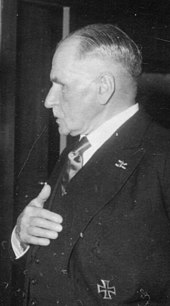Erich von dem Bussche-Ippenburg
Erich Freiherr von dem Bussche-Ippenburg (born March 12, 1878 in Naumburg (Saale) , † October 1, 1957 in Lehnerz ) was a German officer , most recently general of the artillery .
Life
He came from the East Westphalian aristocratic Bussche family and on July 31, 1894 joined the 1st Kurhessian Field Artillery Regiment No. 11 of the Prussian Army in Kassel as an ensign . There he was promoted to second lieutenant on January 27, 1896 . From October 1, 1903 to March 20, 1911 he served as regimental adjutant and in the meantime became first lieutenant on May 18, 1907 . As such, he was assigned to the General Staff until March 22, 1913, and transferred here after passing his exam. Captain since 1912 , he spent the First World War continuously in staff positions. Major since 1917 , after the end of the monarchy he was accepted into the Reichswehr and in 1922 was promoted to lieutenant colonel . Here, too, he served on the staff, as head of the Army Organization Department in the Army Office .
In 1925 he took over the III. Division of the 6th (Prussian) Artillery Regiment in Hanover and thus a troop command for the first time. He stayed in this position until 1930, when he - meanwhile Major General - moved to the Reichswehr Ministry to become head of the Army Personnel Office under General Kurt von Hammerstein-Equord .
In an interview with Reichswehr Minister Kurt von Schleicher after the Reichstag election of November 1932 , Bussche expressed his concerns about a possible takeover by Hitler and is said to have been calmed down by him: “You can be very calm; The Wehrmacht won't tolerate that, "Hammerstein is said to have replied:" You can be completely safe. The Reichswehr and myself will never allow ourselves to be ordered by a fool. If he comes and insists on giving us orders, we will have him arrested. ”At a meeting between Hammerstein and Reich President Paul von Hindenburg that may have taken place on January 27, 1933, Bussche is said to accompany his superior against, and Hammerstein for a chancellorship Hitler's pleaded.
After Hitler was appointed Reich Chancellor on January 30, 1933, Bussche, as head of the Army Personnel Office, took part in the historical meeting between Hitler and the Reichswehr leadership on February 3, 1933, in which the newly appointed Chancellor disclosed his foreign and war policy program for the first time.
After his promotion to lieutenant general (since 1 October 1931) Bussche-Ippenburg resigned on 30 September 1933 under presentation of the character as a general of artillery from active service. He was later appointed chief of the 6th Artillery Regiment .
It was not reactivated during World War II .
Awards
- Red Eagle Order IV class
- Order of the Crown IV class
- Prussian service award cross
- Iron Cross (1914) 2nd and 1st class
- Knight's Cross of the Royal House Order of Hohenzollern with swords
- Bavarian Order of Military Merit IV class with swords
- Knight's Cross 1st Class of the Order of Albrecht with swords and with a crown
- Knight's Cross of the Order of the Württemberg Crown
- Knight's Cross 1st Class of the Order of Frederick with Swords
- Friedrich-August-Kreuz II. And I. Class
- Knight's Cross II. Class of the Order of the White Falcon
- Hanseatic Cross Bremen
- Commander II class of the Duke of Saxony-Ernestine House Order with swords
- Order of the Iron Crown III. Class with the war decoration
- Austrian Military Merit Cross III. Class with the war decoration
- Mecidiye Order III. Class with sabers
- Iron crescent
- Knight's Cross of the Order of St. Alexander with Swords
literature
- Dermot Bradley (ed.), Karl-Friedrich Hildebrand, Markus Rövekamp: The Generals of the Army 1921–1945. The military careers of the generals, as well as the doctors, veterinarians, intendants, judges and ministerial officials with the rank of general. Volume 2: v. Blanckensee-v. Czettritz and Neuhauß. Biblio Publishing House. Osnabrück 1993. ISBN 3-7648-2424-7 . Pp. 392-393.
- Hans Magnus Enzensberger : Hammerstein or stubbornness. Suhrkamp. Frankfurt am Main 2008, ISBN 978-3-518-41960-1 .
Individual evidence
- ↑ Thomas Weingartner: Stalin and the rise of Hitler. The German policy of the Soviet Union and the Communist International. In: Contributions to foreign and international politics. Vol. 4, Verlag de Gruyter, 1970, 302 pp.
- ↑ Irene Strenge: Ferdinand von Bredow. Notes from February 2, 1933 to December 31, 1933. Daily records from 1/1/1934 to 6/28/1934. In: Contemporary history research. Vol. 39, Duncker & Humblot Verlag, 2009, 259 pp., ISBN 3-428-52960-X .
- ↑ a b c d e f g h i j k l m n o p q r Reichswehr Ministry (ed.): Ranking list of the German Reichsheeres. ES Mittler & Sohn , Berlin 1930, p. 108.
| personal data | |
|---|---|
| SURNAME | Bussche-Ippenburg, Erich von dem |
| ALTERNATIVE NAMES | Bussche-Ippenburg, Erich Freiherr von dem |
| BRIEF DESCRIPTION | German officer, most recently general of the artillery |
| DATE OF BIRTH | March 12, 1878 |
| PLACE OF BIRTH | Naumburg (Saale) |
| DATE OF DEATH | October 1, 1957 |
| Place of death | Lehnerz |
